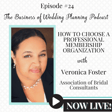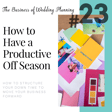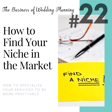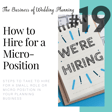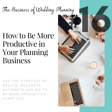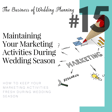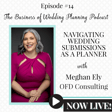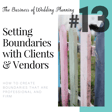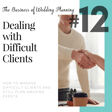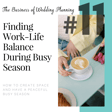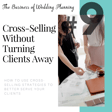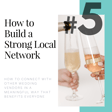Become a Creator today!Start creating today - Share your story with the world!
Start for free
00:00:00
00:00:01

The Anatomy of Pricing
Welcome to my first ever guest! Danielle Hendon of 4 Corners CFO.
You can learn more about Danielle at www.4cornerscfo.com/plannerslounge
Transcript
Introduction to Profitable Wedding Planning
00:00:02
Speaker
Are you a wedding planner just starting your business or have you been in the industry for just a few years? Do you want to build a profitable and enjoyable planning business that you're excited about every day? If the answer is yes, then you're in the right place. Welcome to the business of wedding planning podcast. I'm your host, Amber Peterson. I was a wedding planner for 10 years, a marketing strategist for service-based businesses, and now the owner of Planner's Lounge. I know what it's like to work so hard as a planner but not see the growth and profit you dream of.
Challenges and Personal Experiences
00:00:37
Speaker
I also know that while you can be the most talented planner in your market, if you don't have the business foundation, it will be hard to continue growing.
00:00:45
Speaker
I have seen so many talented planners burn out because they become frustrated with things unrelated to wedding planning, like finances, marketing, team growth, and operations. This is where the Business of Wedding Planning podcast and Planners Lounge come in. Our mission is to help you learn what it takes to build the business of your dreams with simple digital product solutions, educational content, and the support of our free community, the Very Important Planners Lounge, or VIP Lounge for short. I understand what it's like to work in this unique industry while having a lot on your plate. During my time as a planner, I had three daughters, bought and moved to two new homes, and launched two other businesses.
Guest Introduction: Danielle Hendon
00:01:28
Speaker
I am excited to combine my education, industry experience, and passion to help you reach your business goals.
00:01:38
Speaker
Hi, friends. Welcome back to the Business of Wedding Planning podcast. I'm Amber, your host, and today I'm super excited to have a friend of mine and an amazing business owner, Danielle Hendon of Four Corners CFO with me. And we're going to discuss the anatomy of pricing. I know pricing is a tricky subject for new planners. So I wanted to bring in someone who is an expert in all things financial, just to chat about what you should think about when you're setting those prices. So welcome, Danielle. Thank you so much for having me, Amber. I swear any chance I can get to get people to think about the numbers and just even touch on the finance side of things is a win in my book.
00:02:21
Speaker
Yay, I'm so happy you're here. So first of all, can you just introduce yourself and give us a little background on how you became an entrepreneur and your business and who you help and what you do? Absolutely. I'm going to take it way back because I think one of the funniest parts of my origin story is that I never saw any of this coming.
Transition and Fulfillment in Business
00:02:42
Speaker
I actually started my college career as a music major. And I had an English professor that told us to write about the future of our career and I realized that I am never going to make any money because I do not have friends in high places and I'm just going to end up never affording myself. I had some friends that were in the business school and I decided to give that a shot, try it out, did some accounting classes and I absolutely loved it.
00:03:09
Speaker
Ended up getting my master's in accounting and like most people with accounting degrees, I went into public accounting after that. I worked for a public accounting firm and then I had my first child and I realized I did not want to be working 80-hour work weeks with a newborn at home. So being in the Houston area, which is where I'm from, most of my experience at that time was in oil and gas. So when I left public, I landed at an oil and gas company in downtown Houston. And again, I loved what I did. I absolutely loved the people I worked with, the experience that I got, the things I was doing. But they went through bankruptcy and they came out the other side owned by bankers who started slicing and dicing and eventually
00:03:55
Speaker
Two years later, the pandemic hit and we realized the doors were going to close. They were selling things for pennies on the dollar. It was it was over. So this billion dollar business had gone down to about 20 people when I got let go. But I realized that and I don't want to take away from the trauma or the pain or all of the things that happened in the pandemic. I know so many people lost so many things. But I think there's a silver lining for a lot of us where the pandemic forced us to slow down in life. And I got to be a completely different type of parent. I was get them to swim practice, get to know the coaches, get to know their friends, communicate with the teachers.
00:04:40
Speaker
And it was this whole other side that I didn't want to give up because I will be honest and say, I'm a bit of a workaholic. When you love what you do, you do it a lot.
Pricing Strategies for Wedding Planners
00:04:49
Speaker
Having that moment in time to slow down and get a different perspective on parenting was kind of a gift that I didn't want to give up. And I didn't want to go back downtown and be doing it all over again. So I took a leap of faith and with the help of My dear friend, Amber, I connected with another CFO that actually does some fractional CFO work and realized how feasible this really is, like how doable it is to go out and be a fractional CFO to small business owners. Not only is it doable, but it is so much more rewarding when I get to help business owners increase livelihoods and legacies and have an impact on their communities rather than just increasing share prices for corporations.
00:05:40
Speaker
I love that. And I think it's so interesting when no matter like what industry you're in, there's so many things about what you said, I think can apply to people who get into wedding planning. I know very few wedding planners that they came to this because they were like, I'm going to go to college and I'm going to be a wedding planner. It's usually because they did something similar and then they really wanted more freedom, more flexibility. They love helping people on this amazing day in their life. But it's what I also know and you probably know working with lots of different industries is if you're not making money, then you're not going to be able to continue to do it. And the burnout rate becomes higher and higher when it feels like you're working for free.
00:06:27
Speaker
And there are just so many amazing people who are wedding planners that deserve to make a living wage. And they need to do that by setting the right prices, right? Absolutely. And actually the IRS will call you a hobby if you go three years without making money. So you want to make sure your business is making money. and able to pay you, not just from a burnout perspective, but also just really compliance. Nobody wants the IRS to come back and say, well, all that money you spent was really just you having fun. Oh, yeah. And it is so disheartening to feel like you are working so hard because
00:07:07
Speaker
Contrary to what people might think, being a wedding planner is not walking around in super high heels and just being like ultra glamorous at weddings. It is often crawling on the floor, looking for outlets, like all the dirty things no one else wants to do at a wedding. And so if then at the end you're like, and I made $6, that is just a punch in the gut. Let's jump into kind of what I see as the things that wedding planners tend to underestimate when they're starting to set their prices is how long it takes to deliver your services. Because we're selling just our expertise and the execution of a wedding, a lot of times when you set a price, you're like, wow, that sounds like a lot of money. But then when you break it all out, it's like,
00:07:54
Speaker
That was like $7 an hour I made on that wedding. You underestimate the costs involved with delivering the service. And then finally, and the most importantly, they just forget or just intentionally don't pay themselves because they either didn't make enough or they want to put that money back in the business. I want to get your feedback on kind of how do people go about just the initial process of setting prices instead of just pulling something out of thin air thinking, that sounds great. That sounds like a lot of money.
00:08:27
Speaker
I'm a huge fan of always doing your research. So I think market research and getting to know what's normal in the wedding planning industry is a big part of it. But I want to talk a little bit about the pieces you mentioned, because there's one more that people don't often take account for. When you talk about anatomy of pricing, think about the fact that whatever your price is, this is the only way money comes into your business. This has to pay everything. It has to pay you for your time. It has to pay anybody that helps you. It has to cover any costs if you've got kind of pass-through contractors providing things. You've got to cover all of that. But then you also have to cover the costs of running a business.
00:09:13
Speaker
In accounting terms, people like to talk about expenses as either fixed or variable. I feel like that can be confusing to a lot of business owners. So we actually talk to people about revenue generating expenses. and operating expenses.
Expense Tracking and Cash Flow Management
00:09:30
Speaker
And if you're looking at your P and&L, your profit and loss, I hope all of you are in QuickBooks or something similar, and you're taking a look at those numbers at least a little bit. When you look at that, the revenue generating costs,
00:09:44
Speaker
are exactly what they sound like. They sit right there by your revenue number, by your sales number. The operating costs sit down underneath all of that, and they're the operating expenses to run the business. They don't actually generate revenue. So when you're thinking about the price that you need to set, a lot of people think about the revenue generating costs. Not a lot of people remember to value their time, but they do think about the costs. So the number one issue that service providers like a wedding planner run into is, well, I don't have any costs. Oh, but you do. You have so many costs. First of all, you yourself and your time are the most valuable cost to this business. So make sure that you're valuing your time. But then you do have other costs of running your business. You have operating expenses.
00:10:34
Speaker
that your sales have to cover the cost of, or you're gonna go broke, and nobody wants to be broke after doing all that work. Yeah, absolutely. And I think some of the things that I can think of off the top of my head that might get forgotten is, so there's a lot of like technology platforms and things that we use to assist with our planning. um so But you might pay that like on a yearly basis. So once it's paid, you're just like, oh, that's paid. But ah those kind of you subscriptions and the gas that you spend to go to and from weddings, the things like that,
00:11:10
Speaker
those all have to be tracked and factored in is what I'm hearing you say so that you're not just saying, okay, well, it's going to be a hundred hours to deliver this. I'll divide this amount by a hundred hours and that's what I want to make. When you start factoring into all those other costs in your business, that really starts reducing what profit you might have at the end or just what you're actually accruing inside your business. Yeah, I mean, think about but the cost of gas right now, just running back and forth to the different venues and to go get things and to meet your your bride, to go taste wedding cakes, and you're driving all over the place.
00:11:50
Speaker
You've got to factor that in. And I would actually say that is a revenue generating cost. The gas and even the price of your vehicle, check with your tax person, make sure they're okay with it. But I would venture that even that is a revenue generating cost for your business. You could not perform the service. without those things. You wouldn't be able to get paid if you didn't spend the money on gas and a car and have your physical presence and mind there to help them. So those are kind of those revenue generating. But then like you said, software is a huge
00:12:25
Speaker
operating expense for so many people. And if you guys are anything like me, I get shiny object syndrome all the time. So it's like, oh, but I could do this thing with that thing. And you just end up bolting all these different things on before you know it. I've got Calendly plus Zoom plus my CRM. Why do I need 10 different things that do the same thing? Yeah. And then at least in our industry, I'm sure it's the same in lots of other industries. There are so many people that are coming out with new things that are going to make you a better planner, help you be more efficient, all of the things. And so it is very easy, especially when you get into those like, Oh, it's a 30 day trial. And then, and then you forget to cancel it, even if you're not using it. And before you know it, you're, you know, hundreds of dollars, if not more is going out the the door every month and
00:13:12
Speaker
you're not that's not factored in into the cost of delivering services. Yup. So when we are calculating your price, when you're trying when we're talking about that anatomy of pricing, we've talked about the different pieces. But then how do you actually come up with a price? So like you said, you may pay one subscription one month and not see it again for a year. I like to look at businesses in kind of a one-year window. And that year may not be January through December. For so many of you wedding planners, you're going to want to go based on the seasonality of the wedding planning business.
00:13:50
Speaker
When are you making money and when are you not making money? But get a full 12 months because there are going to be things that happen at different points in that and figure out what are all of those operating expenses that need to be covered. And then for anybody that's doing this full time, the easy calculation when it comes to your hours in the business, a fall time week is 40 hours a week. For 52 weeks, that's technically 2,080 hours. But I always tell people to use 2,000 because it's an easier number and we all deserve a little vacation time. So with 2,000 hours, how much money do you need to make in this business to make it viable, to make it support your family, support your desires? Because burnout is real. And if you're not paying yourself and prioritizing yourself in this business,
00:14:41
Speaker
you will go out of business because you're just going to be sick and tired of it. That makes a lot of sense. And I imagine if you look at it in a full year, even though we have really busy seasons where you might have a lot of money coming in, if you break it out over a whole year, then maybe you can stabilize that a bit and be even staggering when you pay yourself. Even if you have all your money come in in a specific four months, if you plan correctly, you could provide yourself a paycheck throughout the whole year if you plan and strategize and things like that. Because I know planners can live in this like feast or famine mindset where it's like, oh my gosh, I'm just swimming in money. And then
00:15:23
Speaker
And then suddenly you can't pay the bills. Right. At the end of january or end of December, you're like, oh, I can't wait for booking season when those deposits start rolling in. But if that could be stabilized, that's going to alleviate a lot of stress and also just, I would feel like give you some room to breathe and make really smart decisions instead of making decisions from kind of a panicky place where you're like, I have no money, what do I do?
Mindset and Pricing for Sustainability
00:15:50
Speaker
Yes, having that Feaster Famine cashflow cycle is gonna be so much easier when you know what it takes to keep the lights on every month. And I'm gonna keep hitting on this because it's such a personal passion of mine. Paying yourself is part of keeping the lights on.
00:16:08
Speaker
So, in that kind of anatomy we were talking about, if you want to make, I don't know, I'm just going to grab a number out of thin air, this may be wildly inaccurate, but if you want to make $50,000 this year and you've got $2,000 in the year, if we take, I'm actually going to pull up a calculator because my brain and mouth are not working right now, so if we take that $50,000, you want to be making at least $25 an hour. That's totally doable. $25 an hour. But here's where it gets tricky. As a feast or famine kind of cyclical business owner, you are going to put in more hours during wedding season than you will when it's not wedding season.
00:16:50
Speaker
So if we want that to be $25 an hour, I would actually recommend you aim for 50 when you're pricing things out at least. And this does not include the other costs. So we're talking about like that anatomy right now. So now we've got, we need to factor in $50 an hour of our time for however much time goes into the wedding. And back to what you said, Amber, make sure that you are planning enough time Similar to what I just did with the 25 and I doubled it up to 50, whatever you're thinking it's going to take, you need to add to that. It's never going to take what you think it's going to take. And you can usually tell when you talk to a new client if things are going to be a little more meticulous, and they might need a little more high touch, and you might need to add a little buffer for that time.
00:17:39
Speaker
So coming up with a good time estimate, multiply that by the hours estimate we just did, that is one component of your pricing. The other component is those operating expenses. So taking all of that and dividing it by 12 and saying, okay, we've got all of these expenses. This is what it comes out to monthly. Now you say how much business are you usually doing in wedding season? how many packages, services, hours, however it is that you price your process, your business, how much do you need to sell to recuperate those expenses that we just talked about? If you've got 10 weddings at $5,000 a piece, that's barely gonna cover the salary piece, but it's not gonna cover the operating expense.
00:18:31
Speaker
So what are we planning to bring in and how do we get the pricing of our services to cover the revenue generating and the operating expenses? And so if someone's listening to this and they're thinking, oh my gosh, that is way more than I would ever charge, as especially because we, a lot of newer planners or even planners that have been in business for a few years and might be like, I have made zero dollars. Like I need to really figure this out. There's definitely some mindset stuff about pricing and raising prices, which as a side note, if you are a few years in and you haven't raised prices, you should be
00:19:11
Speaker
reevaluating and raising prices every year, but how can people, as they're working through this, and I know we've you know this is touching a little bit ahead on mindset, but just to get into that, like I need to charge what I need to charge when you're starting this process and not immediately low balling yourself. Do you have anything that you work with your clients about talking about that mindset stuff around pricing? It is all mindset and especially not to sound sexist, but most wedding planners are probably female. And as women business owners, we do not
00:19:50
Speaker
tend to value ourselves the same way that men do in business. It is very black and white to them and it is this mushy gray area that we question and doubt and don't want to lose people and don't want to hurt feelings and want to help all the people. It's it's a very gray space. What I will say is one of my favorite ways to think about this and kind of thought shifts that I work on with my clients. is if you are no longer able to pay yourself, if you can't pay yourself, you can't stay in business. And if you can't stay in business, you're not helping the people you wanna help. They're not getting the help. They may not get it at all if you're not there. In order to stay in business, you have to charge rates that allow you to stay in business. Now that doesn't mean that we're all getting like frivolous and going crazy and not also taking care of our finances and making sure that we're spending wisely and all the things.
00:20:46
Speaker
But if you can't pay your bills at home, you're not going to be able to stay in business and keep helping these people. Absolutely. I think that's a great way to look at it. And I worked with a sales coach once that also said, don't make decisions from other people's wallets. So even if you're looking at what you need to charge and you're thinking, well, that's so much, I don't want to ask for that much. People are paying you for your expertise, no matter if you this is your first season or your 20th season, they're coming to you for a reason and you can't make decisions about what they're willing to spend based on your own like money past, your money mindset, all of that. Whatever I feel weird about pricing, I would always think,
00:21:29
Speaker
It's not my business. like This is their bank account and if they want what I'm offering, then that's their business to make the decision. But I'm just delivering information and that's my price and that's just information I'm giving out. So I like that, like thinking about if you're not around in three years, you can't help those couples that need you in three years. You can't. And then I mean, I'm sure there are other wedding planners, but they're not going to be you. And they may not do things the way you do. And I am a huge fan of abundance mentality. And there are more than enough people out there for all of us. And we are all meant to serve who are meant to serve in these businesses.
00:22:10
Speaker
The other thing I will tell you that we do a lot with our clients when someone is specifically raising rates. So if you already have your price set and you're doing the math and realizing this is not going to cover what I need it to cover and you've done a little market research and you know that you probably could raise your rates a little bit based on what you hear other people are charging in the area. You guys have a great community to turn to, to kind of bounce things off of each other and figure out what is going on in the market. then you have to physically remind yourself that if somebody turns away and says, no, it might actually be even better for you this way. So the math problem that I'll give you, and we'll use that
Managing Client Load and Personal Success
00:22:52
Speaker
same one. So if you've got, we want you to have 10 clients at $5,000 so that you can get even more at $5,000 and cover all those operating expenses, right? If $5,000 feels high, let's say you're at 2,000 right now and you've got 20 clients at 2,000.
00:23:08
Speaker
that 20 clients at 2000 is probably taking almost twice as much work as the 10 at five and it's making you less money. So for every single one of those that actually walks away, they open up the door for the $5,000 client to come in and make you more money for less time. Cause 20,000 at 2000, 20 clients at 2000 is $40,000 versus 10 clients at 5,000 being $50,000. I love that. And I think that a lot of people, especially if you're newer, like you have a, I'm sure that you have a planner that you look to that's like, Oh my gosh, they're so successful. I want to be like them. But one thing we talk about a lot within the the planners launch community is defining your own version of success and
00:24:00
Speaker
that and the people who listen to this know I am constantly harping on finding your ideal client and not trying to serve everyone because if you are if you have 20 weddings at $2,000 a wedding and It feels like you are just running yourself ragged and you're not enjoying it. your But you're like, well, I have to be booked. I have to have two weddings a weekend. And that's what success means. so No, not at all. There were years in my business where five weddings a year was fully booked for me.
00:24:31
Speaker
because I had children at home and i I knew what I wanted to give to my business. And at that point, that was all I had to give. And my pricing was set accordingly so that it was almost like a scarcity pricing because I only had five weekends. So if you want them, you have to pay for them. And so think about what does success look like for you in this season of life when you're thinking about pricing and it doesn't have to be. you know, double wedding weekends for six months of the year or, you know, ah having a huge team or, you know, there's so many things.
00:25:07
Speaker
When building your business that will also relate to how you price in your business and success is not doesn't have to be what it is to someone else. When you're thinking about all this like think about just kind of the the general ambiance you want I guess in your in your business. And I always think how do I want to feel at the end of this wedding season when you're thinking about how many weddings you want to book and do I want to feel like at that last wedding you're just counting the minutes until that couple gets in the car and leaves and you're like
00:25:37
Speaker
like, thank you, this season's over? Or do you want to feel like that was an amazing season and I feel like energized to now use the off season to work on my business and plan for next year? Or are you like, I just need to put this business away and like sleep for six months? Because that also factors into that burnout and that, you know, all the things that go together to determine if this is your your path for the foreseeable future. There are only so many hours in the day and we don't get them back, which actually brings to mind another thought when it comes to pricing. If you are the kind of business owner that wants to be able to grow a business, that wants to add to your team, that wants to give that like up and coming wedding planner a chance to be your assistant, you have to be priced at a point that can make money on top of paying them.
00:26:29
Speaker
and bringing it all the way back because I'm a harp on it a lot. If you are not paying yourself, your pricing still needs to be good enough that it could pay somebody else to do the job. And if it's not, you are way under pricing. Yeah, and as someone who has been there, there is nothing worse than being like, well, I need an assistant and your assistant is getting paid, but you're not. And it it is a very surreal feeling to walk away from a wedding and be like, I didn't make anything because I had to pay people to help me because this was such a you know intricate wedding or it was a huge guest list and I needed three assistants. One thing, and I'll just mention this as a side note,
00:27:09
Speaker
If you use like assistance on a contract basis, that's what I did. like I had like a pool that I'd pull from. yes the cup I always had in my contract, if your guest list surpasses this many people, I add an assistant and this cost is added to your and this many people so that you're not just saying, yes, yes, yes, I can do that, which I know is a It's an instinct for us to be like, of course I can help you with that, like because you're here to help them with this huge day. But if you keep saying yes to things that are going to cost you money, then that just eats away at that profit little by little. little Even if you're priced appropriately to start, it's still like you pay an assistant, then you have to you know pay their travel costs and all those things. so
00:27:55
Speaker
not only like having a good starting price, but also having very firm boundaries if couples are adding to the scope of your work and charging for that as they make add-ons. Because again, I've it made all the mistakes. there were so many weddings where I just say yes. And then it's like, well, that's going to cost me money and that's going to cost me money. And before you know it, you're down to nothing. So just all the boundaries, all of the like appropriate pricing to get to the point where you're yourself being paid something for your expertise and work, because that's who they hire is you, the like the lead planner, the face of your business. Like they're not hiring your assistant for a reason. They're hiring you.
00:28:39
Speaker
And I'll give you one of my favorite rule of thumb kind of calculations for a service-based business. And when we were talking about those revenue generating costs, which are pretty much always ours, whether it's yours or someone else's, the rule of thumb is to charge twice as much as the cost, and that will help you cover all those operating expenses and the other things going into it. So if it's gonna cost, 2,000 hours worth of time, yours and an assistant, then that needs to be a $4,000 wedding. All right. That makes a lot of sense. If someone's sitting down, they theyve figured out their revenue generating expenses. They figured out their operating expenses. They're ready to figure out how to set their price once they have something in place. And let's say it's the first season they're working in this new pricing model they've created.
00:29:36
Speaker
How do you recommend kind of keeping track to make sure that that's like an appropriate price? I'm sure. Do you have clients where it's like, oh, that wasn't quite right. I need to adjust or how like is it just tracking everything or how do you advise working around that? It can be as complicated or as simple as you want. It does get a little bit tricky for cyclical businesses like wedding planning. So the first thing I would say is that operating expense when we said, okay, let's calculate it out. Let's figure out what the monthly is. You're going to want to know how many months are you generating revenue? What is wedding season for you? How many months have money coming in? And how many months don't? And then for every month where money's coming in, it has to cover its share of months that don't.
00:30:30
Speaker
Does that make sense? So let's say you've got, we're in a simple math, six months of money coming in, six months of not. So every month where money's coming in, it actually needs to cover twice as much operating expense. along with your revenue generating costs. Okay. That makes sense. And I think that's a, that is a big place where I think in general, the wedding industry gets tripped up because it's like, well, I've got all this money coming in, but then it's like, Ooh, but that expenses what it's not. So just making sure you're calculating like, what does this have to cover throughout 12 months, not just during your busy season.
Annual Budget Planning and Profit First Method
00:31:04
Speaker
And it can get as detailed as you want with our clients. We work on a budget to actual process.
00:31:10
Speaker
where we help them build up to a realistic budget based on their revenue and their expenses and revenue generating costs and operating expenses and all of the things. And we build what I call a bottom-up budget. So we literally will, you'll have a line in your budget for the cell phone. You'll have a line for the internet, for the website, for the marketing, each of it gets its own line. So that then when those costs come in, we are making sure that the cost is what we think it's going to be. Because then we forecast that budget out for that year. Remember I said I'd love to look at things in a 12 month full year big picture. So we forecast those costs out for the year and we forecast the revenue. And guess what? If that number is red and negative at the end, we've got a problem we need to fix and that either needs to be the pricing or how many we've got. Okay. Now that makes a lot of sense.
00:31:59
Speaker
And i I would imagine too that if you have this in place and you come to the end of your wedding season, because the way, at least where I planned weddings is about October, we'd wrap up. And then about January is when people started booking again. So that would give you a good time to look at what did we bring in? What were my costs? from January to now, and where are we looking at ending up with this year? So you can immediately be planning for your next season, for your next booking season, and like we mentioned before, be you raising your prices because as a year has passed, so has your expertise increased? You've probably done some conferences, you've
00:32:42
Speaker
warranted with an increase in knowledge, an increase in price. And I also, you know, just taking into consideration, like we mentioned, gas is really expensive right now. You have to adjust your price for just like the cost of existing in a business every year. Well, and your salary for the cost of existing in life, I've told that to so many service providers. You may not have a single, what we call an accounting cost of goods sold, a single product related cost. You still have cost of goods sold. You are a cost. You are one of those revenue generating costs. And even if the expenses in your business haven't gone up, I promise the expenses in your personal life have because good Lord has the cost of groceries gone up. Yeah.
00:33:29
Speaker
Absolutely. And I think that is a great way to like come back to and wrap up with like the the fact that we exchange our time for money. You mentioned, you touched on this, like especially women can kind of undervalue that. But even though it it can be easy to rationalize, well, you know time is free. i've got you know I can give more time. Think about it in the way that if you're saying yes to a client who is underpaying you, or maybe they're adding on something to the scope of your contract, you're saying no to something else. And the way that it clicked in my head is when I would think, okay, I'm saying yes to this and I'm saying no to my kids, or I'm saying yes to this and I'm saying no to my husband. Because the nature of our work is that we often have to be away from our loved ones, the important people in our life,
00:34:23
Speaker
and even miss really important celebrations or milestones because most celebrations and milestones that we plan happen at the exact same time. And so at the very least, if we're going to make these sacrifices, you should get paid and paid well to do so. And that was a mindset set shift that really helped me when I was like, I'm I'm saying no to my family to say yes to your family and to your important things. And I should be compensated accordingly to for that. And I'll even throw in a little Profit First mindset piece of this. If you are not familiar with Profit First, I'm a huge fan. It is a book out by Mike Michalowicz and he talks about paying yourself first and prioritizing that profit because as business owners and especially as women,
00:35:10
Speaker
We are notorious for putting everyone else first. So if you do go book all of these weddings and then you pay the assistance and you pay the bills and you pay all the things and there's nothing left, you don't pay yourself. But if you get all these weddings, and you pay yourself first, I promise you will figure out how to pay everybody else because you won't let it not happen. You will let yourself not get paid, but you will make sure everybody else gets paid. So paying yourself first is one of the best habits you can start to implement in your business.
00:35:44
Speaker
I love that and I am also obsessed with that book. i I'll put a link to that in the show notes. ah We're in no way affiliated with that book, but it just, it was such a game changer in my business and it's very simple and he's a really funny writer, so it's a quick read. But yeah, it definitely is a huge shift when you're like moving money to your account and you always figure out how to make those other payments. like That's easy. it's But when you're looking at all the other payments and you think, I'll pay myself at the end, you're 100% right, it doesn't happen. it just It's the first thing to fall off the list. and so I mean, let's face it, we're all problem solvers. That's why we're in business, right? We know how to solve problems and we will solve them when it comes to other people. Yeah, absolutely. Absolutely.
Final Advice and Resources
00:36:30
Speaker
Well, Danielle, is there anything else that you would like to share with us just about pricing or I know I could talk to you about this forever. I'm so not a numbers person, but the way that you like explain it, I'm like, that makes so much sense. So I appreciate you coming on and I would love to have you back to talk about other financial stuff anytime. Can you tell us where our listeners can find you? Yes. So my parting piece of wisdom would be not to not to undervalue yourself. like there's there is no yes or There's no right or wrong answer. There is no overvaluing yourself. There there really isn't. And trust me when I say you could put $10,000 on that and somebody's going to buy it, you just got to find them.
00:37:18
Speaker
So making sure you don't undervalue yourself. And then where you can find me, we are going to set up a landing page just for you guys. It's going to be on our website. So the number four corners CFO dot com slash planner's lounge. I would put the business a wedding planning, but I don't think that my URL is going to like me being that well. Planner's lounge is perfect. It's easier to write anyway.
00:37:44
Speaker
And I would encourage you, Danielle's website has a ton of great content. Just you can learn more. um She works with a variety of businesses, helping them with all of the back end numbers, stuff, setting budgets. If you ever need extra help, I would go to her in a heartbeat. And she is very good at looking at your numbers, because I know for me, numbers are like a letting someone look in your junk drawer. Like, that's how I felt. And I'm like, no, thank you. Like, that is private. I don't. It's the dirty laundry basket.
00:38:19
Speaker
It is. And she is like your financial best friend. And it's a like, just let's just get it done. No judgment. And just such a resource. So thank you so much for being here, Danielle. I so appreciate you. And I am excited to have you back in the future to talk more about finances. Thank you so much for having me, Amber. Bye.

